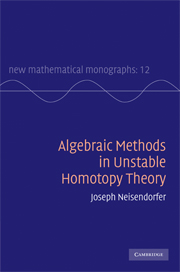Book contents
- Frontmatter
- Contents
- Preface
- Acknowledgments
- Introduction to unstable homotopy theory
- 1 Homotopy groups with coefficients
- 2 A general theory of localization
- 3 Fibre extensions of squares and the Peterson–Stein formula
- 4 Hilton–Hopf invariants and the EHP sequence
- 5 James–Hopf invariants and Toda–Hopf invariants
- 6 Samelson products
- 7 Bockstein spectral sequences
- 8 Lie algebras and universal enveloping algebras
- 9 Applications of graded Lie algebras
- 10 Differential homological algebra
- 11 Odd primary exponent theorems
- 12 Differential homological algebra of classifying spaces
- Bibliography
- Index
8 - Lie algebras and universal enveloping algebras
Published online by Cambridge University Press: 03 May 2010
- Frontmatter
- Contents
- Preface
- Acknowledgments
- Introduction to unstable homotopy theory
- 1 Homotopy groups with coefficients
- 2 A general theory of localization
- 3 Fibre extensions of squares and the Peterson–Stein formula
- 4 Hilton–Hopf invariants and the EHP sequence
- 5 James–Hopf invariants and Toda–Hopf invariants
- 6 Samelson products
- 7 Bockstein spectral sequences
- 8 Lie algebras and universal enveloping algebras
- 9 Applications of graded Lie algebras
- 10 Differential homological algebra
- 11 Odd primary exponent theorems
- 12 Differential homological algebra of classifying spaces
- Bibliography
- Index
Summary
In this chapter we present the theory of graded Lie algebras. Although this theory is usually restricted to the case where 2 is a unit in the ground ring, this restriction is unnecessary and is removed here. The price one pays is the introduction of the additional structure of a squaring operation on odd degree classes. When 2 is a unit in the ground ring, this squaring map is a consequence of the Lie bracket structure. With this modification, the definition of graded Lie algebra satisfies a suitable version of the Poincare–Birkhoff–Witt theorem. The author suspects that this fact was known many years ago, at least to John Moore and to Frank Adams.
The Poincare–Birkhoff–Witt theorem has the immediate consequence that graded Lie algebras embed in their universal enveloping algebras. It also implies that the universal enveloping algebra of an ambiant graded Lie algebra is a free module over the universal enveloping algebra of a sub graded Lie algebra.
The universal enveloping algebra has a Hopf algebra structure in which the graded Lie algebra is primitive. In fact, in prime characteristic p, the module of primitives is generated by the Lie elements and pk-th powers of even degree Lie elements.
The free graded Lie algebras are characterized by the property that their universal enveloping algebras are tensor algebras. The fact that tensor algebras have global dimension one, when combined with the Poincare–Birkhoff–Witt theorem, yields the important result that subalgebras of free graded Lie algebras are themselves free graded Lie algebras.
- Type
- Chapter
- Information
- Algebraic Methods in Unstable Homotopy Theory , pp. 251 - 282Publisher: Cambridge University PressPrint publication year: 2010



